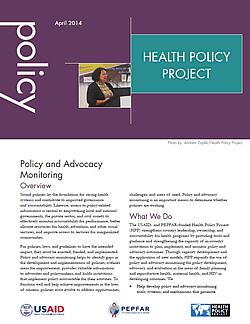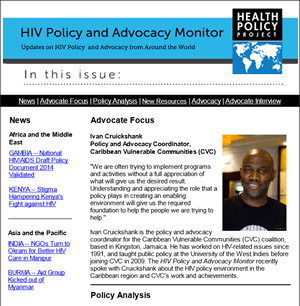The Health Policy Project ended in 2016. Work continued under Health Policy Plus (HP+) until 2022.
Policy Monitoring

Health Policy Project/Jamaica
Overview
Sound policies lay the foundation for strong health systems and contribute to improved governance and accountability. Likewise, access to policy-related information is central to empowering local and national governments, the private sector, and civil society to effectively monitor accountability for performance; better allocate resources for health, education, and other social services; and improve access to services for marginalized communities.
For policies, laws, and guidelines to have the intended impact, they must be enacted, funded, and implemented. Policy and advocacy monitoring helps to identify gaps in the development and implementation of policies, outlines areas for improvement, provides valuable information to advocates and policymakers, and holds institutions that implement policy accountable for their activities. To function well and help achieve improvements in the lives of citizens, policies must evolve to address opportunities, challenges, and areas of need. Policy and advocacy monitoring is an important means to determine whether policies are working.
What We Do
The USAID-funded Health Policy Project (HPP) strengthens country leadership, ownership, and accountability for health programs by providing tools and guidance and strengthening the capacity of in-country institutions to plan, implement, and monitor policy and advocacy outcomes. Through capacity development and the application of new models, HPP expands the use of policy and advocacy monitoring for policy development, advocacy, and evaluation in the areas of family planning and reproductive health, maternal health, and HIV in developing countries. We
- Help develop policy and advocacy monitoring tools, systems, and mechanisms that promote accountability in the governance of health and other social-sector systems.
- Develop tools to capture the information needed to monitor and evaluate the policy process and ultimately the success of policy implementation.
- Provide technical assistance to measure the outcome of policy initiatives in countries receiving support from the U.S. President’s Emergency Plan for AIDS Relief (PEPFAR).
- Build capacity and skills among advocacy groups, civil society, and networks of key populations in policy and advocacy monitoring.
- Help countries determine their highest priority policy interventions; assess the current status of policy interventions; and conduct analyses to understand local perspectives on particular policy interventions and determine how best to engage governments, civil society, and other groups to address needs.
Policy and advocacy monitoring for PEPFAR Partnership Frameworks
In collaboration with the Office of the U.S. Global AIDS Coordinator (OGAC), USAID, and the U.S. Centers for Disease Control and Prevention (CDC), HPP and the University of Washington work to strengthen in-country capacity among U.S. Government teams, partner governments, and civil society organizations to monitor the progress of policy commitments in PEPFAR Partnership Frameworks and Partnership Framework Implementation Plans.
Capacity assessments to support policy and advocacy monitoring to reduce discrimination
Establishing and sustaining an enabling environment involves addressing policy and political barriers that perpetuate HIV-related stigma and discrimination. HPP conducts capacity assessments to identify gaps in available services, activities, and capacities to support key populations, including policy and advocacy monitoring. Read more.
Integration of strategies to address gender-based violence into HIV policies and programs
HPP works to strengthen the capacity of host-country groups to incorporate strategies to address gender-based violence (GBV) within HIV policies and programs. These efforts include raising awareness among decisionmakers of the linkages between GBV and HIV and mapping community services to strengthen GBV referral networks.
National social information system to monitor accountability
HPP worked with the government of Guatemala to implement a national web portal to identify service gaps and support decision making. The Integrated Social Information System provides a platform to monitor implementation of the government’s commitment to increasing access to education services, especially among the poor. Read more.
Publications and Resources
Road Map for Implementing and Monitoring Policy and Advocacy Interventions
Monitoring HIV Policy Interventions in PEPFAR Partnership Frameworks
Linking Health Policies with Health Systems and Health Outcomes: A Conceptual Framework
Policy Analysis for Key Populations at Risk of HIV Infection in Togo
Policy Analysis and Advocacy Decision Model for HIV-Related Services: People Who Inject Drugs
Reforming Operational Policies: A Pathway to Improving Reproductive Health Programs
HIV Policy and Advocacy Monitor
The HPP's HIV Policy and Advocacy Monitor is a monthly newsletter focusing on the advancement, development, and analysis of policies, advocacy campaigns and organizations, and policy-related data to inform the response to HIV and AIDS at the global, national, and local levels. It includes news items, resources, advocacy reports, and innovative policy analyses on a wide range of topics such as treatment, key populations issues, gender, and financing for HIV policies and programs.
If you would like to suggest an item for inclusion in the next issue, please send it to: policyinfo@futuresgroup.com.



